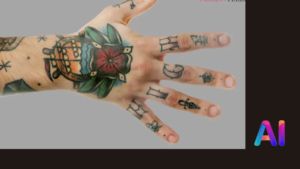Introduction:
The Art and Significance of Tattoos: A Cultural Tapestry
Tattooing is an art form and expression that transcends age, culture, and geography. From ancient tribal symbols to modern graphic designs, tattoos have served as declarations of love, marks of status or bravery, expressions of individuality, and even forms of punishment. This article delves into the rich tapestry of tattooing, exploring its history, cultural significance, and the evolving attitudes towards this ancient yet ever-modern art form.
Historical Roots
The history of tattoos is as old as humanity itself. Ötzi the Iceman, a 5,300-year-old mummy discovered in the Alps, bore tattoo marks that were possibly therapeutic. Ancient Egyptian mummies have tattoos that denote status and beliefs. Polynesian cultures used tattoos to signify social rank, tribe affiliation, and achievements. In Japan, tattoos evolved from symbols of spirituality to works of art and, at times, marks of punishment.
Cultural Significance
In many cultures, tattoos are deeply imbued with meaning. For the Maori people of New Zealand, the traditional “moko” facial tattoos are a rite of passage, representing lineage, status, and achievements. In the Polynesian context, tattoos, or “tau,” are a form of identity and personal narrative. In the West, tattoos were initially associated with sailors, soldiers, and outlaws, but they have become a mainstream form of personal expression and artistry over time.
The Art of Tattooing
Tattooing is an art that requires skill and precision. Artists use needles to deposit ink into the skin’s dermis layer, creating permanent designs. The styles and techniques vary widely, from the traditional hand-tapped tattoos of the Samoan “tatau” to the intricate, colorful designs of modern tattoo machines. Each tattoo artist brings unique styles, from photorealistic portraits to abstract geometric patterns.
Evolving Attitudes
The perception of tattoos has evolved significantly over the years. While once seen as rebellious or unprofessional, tattoos are now recognized as personal expression and art. Celebrities, professionals, and individuals from all walks of life proudly display their tattoos, showcasing their stories, beliefs, and aesthetic tastes. This shift reflects broader cultural changes toward accepting and appreciating individuality and self-expression.
Personal Significance
For many, tattoos are more than body art; they are deeply personal symbols of important life events, memories, or loved ones. They can remind us of overcoming challenges, marking significant achievements, or expressing unique philosophies. The decision to get a tattoo is often accompanied by considerable thought, reflecting the wearer’s identity, experiences, and aspirations.

Tattoos are a powerful form of self-expression that bridges past and present, tradition and innovation. As society continues to evolve, so does the art of tattooing, reflecting the changing values, attitudes, and aesthetics of cultures worldwide. Whether as a mark of identity, a work of art, or a personal symbol, tattoos remain a profound way for individuals to tell their stories through ink embedded in the canvas of the skin.
Why Are Tattoos Haram But Not Piercings
In a world adorned with diverse cultural expressions, the question of body modification carries significant weight, especially within the context of religious beliefs. One such query that frequently surfaces is, “Why are tattoos haram but not piercings?” Let’s delve into this intriguing subject, exploring the religious perspectives and shedding light on the nuances that differentiate these two forms of self-expression.
Where in the Quran Does It Say Tattoos Are Haram?
To comprehend the stance on tattoos within Islam, we must turn our gaze to the Quran, the holy book that serves as a guiding light for Muslims worldwide. While the Quran doesn’t explicitly mention tattoos, scholars derive their interpretations from broader principles.
The concept of altering the creation of Allah is a fundamental consideration. In Surah Al-Baqarah (2:195), the Quran emphasizes, “And do not throw yourselves into destruction.” This verse is often invoked to argue against tattooing, as it involves altering the natural state of the body. Islamic scholars opine that tattoos, being a permanent change to the creation of Allah, fall under the umbrella of self-mutilation and are consequently deemed haram.
However, it’s crucial to note the diversity of perspectives within the Islamic community. Some scholars contend that if a tattoo does not convey a prohibited message or symbol, its permissibility may be more lenient. As with any religious interpretation, nuances and varying opinions exist.
Why Are Piercings Not Haram?
In the realm of body piercings, the narrative takes a different turn. While the Quran does not explicitly address piercings, scholars draw from the Hadith (sayings and actions of Prophet Muhammad) and cultural practices prevalent during the time of the Prophet.
Piercings have historical roots in various cultures, including pre-Islamic Arabian societies. The Prophet Muhammad himself acknowledged the practice of wearing earrings during his time. This historical context contributes to the more permissive view on piercings within Islam.
Moreover, piercing is generally considered a reversible modification. Unlike tattoos, piercings are not a permanent alteration to the body. This aspect aligns with the Quranic emphasis on avoiding permanent harm to oneself, as mentioned in Surah Al-Baqarah.
The Islamic View on Tattoos
To further unravel the intricacies of why tattoos are deemed haram in Islam, it’s essential to delve into the broader Islamic perspective on self-expression and body modification. Islam places a significant emphasis on the sanctity of the human body as a creation of Allah.
The prohibition of tattoos is often associated with the idea of “changing the creation of Allah,” as mentioned in Surah An-Nisa (4:119). Scholars argue that tattoos, being a permanent alteration, interfere with the natural state in which Allah created the human body. The act of tattooing is viewed as an act of disobedience to Allah’s divine design, and thus, it is discouraged.
Additionally, tattoos may carry cultural or religious symbols that contradict Islamic teachings. The permanence of tattoos raises concerns about the potential perpetuation of unIslamic messages, making the act of tattooing even more contentious within the Islamic framework.
The Islamic View on Body Piercing
In contrast to tattoos, body piercing finds a more lenient stance within Islam. While the Quran does not explicitly address the topic, the Hadith provides some insights. Historical evidence suggests that the Prophet Muhammad approved of ear piercings during his lifetime.
Islamic scholars argue that piercings, being a reversible and temporary modification, do not infringe upon the principle of altering Allah’s creation. The acceptance of piercings is rooted in the understanding that this form of body modification does not carry the same permanence as tattoos, aligning with the Quranic emphasis on avoiding irreversible harm to the body.
Summary
In the intricate tapestry of Islamic teachings, the perspectives on tattoos and piercings weave a nuanced narrative. The forbiddance of tattoos finds its roots in the Quranic principle of avoiding permanent alterations to the creation of Allah, while the acceptance of piercings is grounded in historical practices and the temporary nature of this form of body modification.
As individuals navigate the intersection of religious beliefs and personal choices, understanding the underlying principles becomes paramount. While the question of why tattoos are haram but not piercings may lack a straightforward answer, the exploration of Quranic verses, Hadith, and historical context sheds light on the diverse perspectives within the Islamic community.
Thanks for reading this article. Your Suggestions Are Welcome. Write them down in the comment section or Contact Us.
Based on the above findings, some recommendations include
Step-by-step prerequisites and requirements of the website and best web hosting services for small businesses.
“Your appreciation warms our hearts! We’re genuinely thankful that you found our blog enjoyable. If you’re eager to see significant growth in your business, whether it’s through SEO, digital marketing, web development, or any other services, we’re your dedicated partners in success. It’s time to turn your aspirations into achievements. Take the first step today by contacting us. Let’s collaborate and take your business to new heights – the future of your success starts now!”
Related FAQs
The permissibility of tattoos in Islam is a subject of interpretation. While some scholars argue that any form of tattooing is haram due to the alteration of Allah’s creation, others permit tattoos that do not convey prohibited messages or symbols.
The permissibility of temporary tattoos varies among Islamic scholars. Some consider them permissible as they do not involve a permanent alteration to the body, while others may still express reservations based on the intention behind getting a temporary tattoo.
Historical practices, including those during the time of the Prophet Muhammad, provide contextual insights into the acceptance of certain body modifications within Islam. Practices such as ear piercings, acknowledged by the Prophet, contribute to the more lenient view on piercings within the Islamic framework.

![8 Best Spicy Chips 2024 [Heat Up Your Snacking Game]](https://aiworld3000.com/wp-content/uploads/2024/02/Untitled-design-2-348x215.png)
![15 Best Frozen Corn Dogs of 2024 [Unlock the Corny Magic]](https://aiworld3000.com/wp-content/uploads/2024/02/Untitled-design-1-348x215.png)